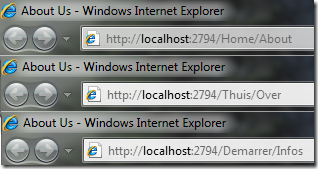Translating routes (ASP.NET MVC and Webforms)
Edit on GitHub For one of the first blog posts of the new year, I thought about doing something cool. And being someone working with ASP.NET MVC, I thought about a cool thing related to that: let’s do something with routes! Since System.Web.Routing is not limited to ASP.NET MVC, this post will also play nice with ASP.NET Webforms. But what’s the cool thing? How about… translating route values?
For one of the first blog posts of the new year, I thought about doing something cool. And being someone working with ASP.NET MVC, I thought about a cool thing related to that: let’s do something with routes! Since System.Web.Routing is not limited to ASP.NET MVC, this post will also play nice with ASP.NET Webforms. But what’s the cool thing? How about… translating route values?
Allow me to explain… I’m tired of seeing URLs like http://www.example.com/en/products and http://www.example.com/nl/products. Or something similar, with query parameters like “?culture=en-US”. Or even worse stuff. Wouldn’t it be nice to have http://www.example.com/products mapping to the English version of the site and http://www.exaple.com/producten mapping to the Dutch version? Better to remember when giving away a link to someone, better for SEO as well.
Of course, we do want both URLs above to map to the ProductsController in our ASP.NET MVC application. We do not want to duplicate logic because of a language change, right? And what’s more: it’s not fun if this would mean having to switch from <%=Html.ActionLink(…)%> to something else because of this.
Let’s see if we can leverage the routing engine in System.Web.Routing for this…
Want the sample code? Check LocalizedRouteExample.zip (23.25 kb)
Mapping a translated route
First things first: here’s how I see a translated route being mapped in Global.asax.cs:
[code:c#]
routes.MapTranslatedRoute(
"TranslatedRoute",
"{controller}/{action}/{id}",
new { controller = "Home", action = "Index", id = "" },
new { controller = translationProvider, action = translationProvider },
true
);
[/code]
Looks pretty much the same as you would normally map a route, right? There’s only one difference: the new { controller = translationProvider, action = translationProvider } line of code. This line of code basically tells the routing engine to use the object translationProvider as a provider which allows to translate a route value. In this case, the same translation provider will handle translating controller names and action names.
Translation providers
The translation provider being used can actually be anything, as long as it conforms to the following contract:
[code:c#]
public interface IRouteValueTranslationProvider
{
RouteValueTranslation TranslateToRouteValue(string translatedValue, CultureInfo culture);
RouteValueTranslation TranslateToTranslatedValue(string routeValue, CultureInfo culture);
}
[/code]
This contract provides 2 method definitions: one for mapping a translated value to a route value (like: mapping the Dutch “Thuis” to “Home”). The other method will do the opposite.
TranslatedRoute
The “core” of this solution is the TranslatedRoute class. It’s basically an overridden implementation of the System.Web.Routing.Route class, using the IRouteValueTranslationProvider for translating a route. As a bonus, it also tries to set the current thread culture to the CultureInfo detected based on the route being called. Note that this is just a reasonable guess, not the very truth. It will not detect nl-NL versus nl-BE, for example. Here’s the code:
[code:c#]
public class TranslatedRoute : Route
{
// ...
public RouteValueDictionary RouteValueTranslationProviders { get; private set; }
// ...
public override RouteData GetRouteData(HttpContextBase httpContext)
{
RouteData routeData = base.GetRouteData(httpContext);
if (routeData == null) return null;
// Translate route values
foreach (KeyValuePair<string, object> pair in this.RouteValueTranslationProviders)
{
IRouteValueTranslationProvider translationProvider = pair.Value as IRouteValueTranslationProvider;
if (translationProvider != null
&& routeData.Values.ContainsKey(pair.Key))
{
RouteValueTranslation translation = translationProvider.TranslateToRouteValue(
routeData.Values[pair.Key].ToString(),
CultureInfo.CurrentCulture);
routeData.Values[pair.Key] = translation.RouteValue;
// Store detected culture
if (routeData.DataTokens[DetectedCultureKey] == null)
{
routeData.DataTokens.Add(DetectedCultureKey, translation.Culture);
}
// Set detected culture
if (this.SetDetectedCulture)
{
System.Threading.Thread.CurrentThread.CurrentCulture = translation.Culture;
System.Threading.Thread.CurrentThread.CurrentUICulture = translation.Culture;
}
}
}
return routeData;
}
public override VirtualPathData GetVirtualPath(RequestContext requestContext, RouteValueDictionary values)
{
RouteValueDictionary translatedValues = values;
// Translate route values
foreach (KeyValuePair<string, object> pair in this.RouteValueTranslationProviders)
{
IRouteValueTranslationProvider translationProvider = pair.Value as IRouteValueTranslationProvider;
if (translationProvider != null
&& translatedValues.ContainsKey(pair.Key))
{
RouteValueTranslation translation =
translationProvider.TranslateToTranslatedValue(
translatedValues[pair.Key].ToString(), CultureInfo.CurrentCulture);
translatedValues[pair.Key] = translation.TranslatedValue;
}
}
return base.GetVirtualPath(requestContext, translatedValues);
}
}
[/code]
The GetRouteData finds a corresponding route translation if I entered “/Thuis/Over” in the URL. The GetVirtualPath method does the opposite, and will be used for mapping a call to <%=Html.ActionLink(“About”, “About”, “Home”)%> to a route like “/Thuis/Over” if the current thread culture is nl-NL. This is not rocket science, it simply tries to translate every token in the requested path and update the route data with it so the ASP.NET MVC subsystem will know that “Thuis” maps to HomeController.
Tying everything together
We already tied the route definition in Global.asax.cs earlier in this blog post, but let’s do it again with a sample DictionaryRouteValueTranslationProvider that will be used for translating routes. This one goes in Global.asax.cs:
[code:c#]
public static void RegisterRoutes(RouteCollection routes)
{
CultureInfo cultureEN = CultureInfo.GetCultureInfo("en-US");
CultureInfo cultureNL = CultureInfo.GetCultureInfo("nl-NL");
CultureInfo cultureFR = CultureInfo.GetCultureInfo("fr-FR");
DictionaryRouteValueTranslationProvider translationProvider = new DictionaryRouteValueTranslationProvider(
new List<RouteValueTranslation> {
new RouteValueTranslation(cultureEN, "Home", "Home"),
new RouteValueTranslation(cultureEN, "About", "About"),
new RouteValueTranslation(cultureNL, "Home", "Thuis"),
new RouteValueTranslation(cultureNL, "About", "Over"),
new RouteValueTranslation(cultureFR, "Home", "Demarrer"),
new RouteValueTranslation(cultureFR, "About", "Infos")
}
);
routes.IgnoreRoute("{resource}.axd/{*pathInfo}");
routes.MapTranslatedRoute(
"TranslatedRoute",
"{controller}/{action}/{id}",
new { controller = "Home", action = "Index", id = "" },
new { controller = translationProvider, action = translationProvider },
true
);
routes.MapRoute(
"Default", // Route name
"{controller}/{action}/{id}", // URL with parameters
new { controller = "Home", action = "Index", id = "" } // Parameter defaults
);
}
[/code]
This is basically it! What I can now do is set the current thread’s culture to, let’s say fr-FR, and all action links generated by ASP.NET MVC will be using French. Easy? Yes! Cool? Yes!
Want the sample code? Check LocalizedRouteExample.zip (23.25 kb)
This is an imported post. It was imported from my old blog using an automated tool and may contain formatting errors and/or broken images.



0 responses